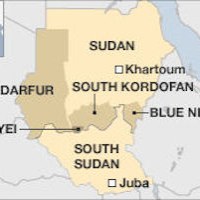![]()
Tue, Jan 29, 2013 | MEForum | by Raymond Ibrahim
Originally published in the Gatestone Institute.

Ethiopian Christian immigrants are living under difficult social, cultural and economic conditions in Yemen…In order to survive, a Christian in Yemen has to convert to Islam or be alienated. The consequences of not converting can be felt in both life and death. (source: addisabram)
When one thinks of Yemen — the impoverished Arab country that begat Osama bin Laden and is cushioned between Saudi Arabia and Somalia, two of the absolute most radical Muslim nations — one seldom thinks of Christians, primarily because they are practically nonexistent in such an inhospitable environment. In fact, most tallies suggest that Yemen’s entire non-Muslim population is less than one percent.
However, a new Arabic report discusses the existence of Christians in Yemen, and their plight — a plight that should be familiar by now, wherever Christian minorities live under Muslim majorities.
Unofficial statistics suggest that there are some 2,500 indigenous Christians in the nation, practicing their faith underground, even as hostile tribes surround them. According to human rights activist, Abdul Razzaq al-Azazi, “Christians in Yemen cannot practice their religion nor can they go to church freely. Society would work on having them enter Islam.”
He added that, as in most Muslim countries, “the government does not permit the establishment of buildings or worship places without prior permission,” pointing out that Roman Catholic officials, for example, are currently awaiting a decision from the government on whether they will be allowed to construct a building and be officially recognized by the government in Sana.
A convert to Christianity — an apostate from Islam whose life is forfeit and who naturally prefers to remain anonymous, going by the pseudonym, “Ibn Yemen” (Son of Yemen) — expressed his fear of increased pressure on Christians, especially since the “Islamists now represent the dominant political faction, following the Arab Spring and the protests that brought the fall of President Ali Abdullah Saleh.” He added that even though the old regime “was not Islamist, Christians were still subjected to persecution and scrutiny by the police apparatus under that regime. Authorities did not allow us to practice our religion openly or allow us to build a private church, all because of Islam’s apostasy law. What do you think it will be like now that the Islamists are in power?”
Accordingly, and as another Christian interviewed in Yemen indicated, Christians pray underground in the members’ houses on a rotational basis — not unlike the days of Roman persecution of Christians, when the latter worshipped in underground catacombs. Along with Yemen’s indigenous Christians, there are also some 15,000-25,000 non-native Christians living in Yemen, mostly refugees from Somalia, Eritrea, and Ethiopia, where the persecution of Christians is often even worse than in Yemen, especially Somalia, where Al-Shabaab (“the Youth”) behead Muslim apostates to Christianity on a regular basis. Such Christian refugees from Africa often change their names to Muslim names to avoid harassment in Yemeni society.
Some Christian organizations and institutions do exist, mostly foreign ones, including the American Baptist Mission, which runs Jibla Hospital and the Church which provides services to the poor, orphans, and imprisoned women. These work primarily to serve the community, not facilitate Christian worship. Likewise, another study confirmed the previous existence of five churches in the southern city of Aden, three of which were Roman Catholic, one Anglican, and the fifth of unidentified affiliation: three of those five churches which were built during the British occupation of southern Yemen, were neglected and left to crumble; the fourth became the property of the government; and the fifth was turned into a health facility.
The story of Yemen’s Christians is a microcosm of the story of Islam’s Christians, as it wholly conforms to the current pattern of oppression for Christians under Islam: things were better for Christians — for religious freedom in general — in earlier eras under Western influence; as the Muslim world, which for a while was Western-looking, continues returning to Islam, the things of Islam, its “way,” or “Sharia” — in this case, hostility to non-Muslim worship and apostates — returns; and, as the “Arab Spring” has done elsewhere, Islamists now dominate Yemeni politics, bringing to mind the apostate Ibn Yemen’s apt question: “What do you think it will be like now [for Christians] that the Islamists are in power?”
Raymond Ibrahim is a Shillman Fellow at the David Horowitz Freedom Center and an Associate Fellow at the Middle East Forum.



 RSS
RSS










Latest Comments
Hello Mike, Thank you for your positive feedback to the article. I felt there wasn’t too much critical analysis of ...
Thanks for this considered and well constructed article. A follow up article on the manner in which the editorial contro...
THE CLUELESSNESS OF CLAIMING THAT OBAMA'S MIDDLE EAST POLICIES WERE A FAILURE CANNOT BE FURTHER FROM THE TRUTH, WHAT THE...
As long as Obama is the president of the usa do not trust the us government......
Thank you for an good read....